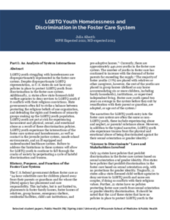LGBTQ youth struggling with homelessness are disproportionately represented in the foster care system. Despite disproportionate LGBTQ representation, 21 U.S. states do not have any policies in place to protect LGBTQ youth from discrimination in the foster care system. Additionally, 11 states allow state-licensed child welfare agencies to deny services to LGBTQ youth if it conflicts with their religious convictions. State governments often fail to strike a balance between protecting the religious beliefs of one organization, and defending the rights and freedoms of minority groups making up the LGBTQ youth population. LGBTQ youth are put at risk for experiencing harassment and physical, sexual, and emotional abuse as a result of these discrimination policies. LGBTQ youth experience the intersections of the foster care system and homelessness, as well as contact in the juvenile justice system, unsafe school environments, and an ill equipped and undereducated healthcare system. Failure to address the limitations in these systems will allow for LGBTQ youth to continue to fall through the cracks of society by perpetuating a cycle of hateful discrimination and trauma.
This analysis of system dysfunction in the U.S. involving legislative powers, child welfare agencies, and peripheral systems, such as juvenile justice, schools, and healthcare, reveals a distinct misalignment in shared values. The homeless LGBTQ youth population are the stakeholders with the most to gain, the most to lose, and the least amount of power in this equation. Generations of LGBTQ foster youth will continue to experience trauma from acts of harassment, violence, and discrimination if these systems are unable to address the failings that are inherent in their design.

